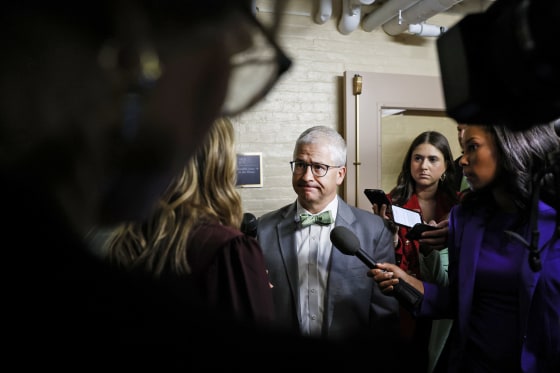The global crisis unfolding in Israel is putting renewed scrutiny on Congress, which has been without a permanent House speaker since Kevin McCarthy was ousted last week.
Hamas on Saturday launched an unprecedented attack on Israel, killing hundreds of people and escalating a decadeslong conflict in the region. President Joe Biden said that U.S. support for Israel is ironclad.
But as an unelected speaker pro tempore, Rep. Patrick McHenry, R-N.C., is effectively powerless on the matter. Under House rules, the interim speaker can act only on matters that relate to the election of a new speaker: gavel in, gavel out, and preside. That post-9/11 rule was designed for continuity of government, not for an unprecedented political situation like the current one. Two scholars with knowledge said the House would need to elect McHenry as speaker pro tem for that to change.
So McHenry couldn’t even pass a resolution condemning the attack?
Exactly. Not unless the House votes to let him do it. There is even a question as to whether McHenry could call for a moment of silence on the House floor — that is how limited his powers are believed to be.
And what about emergency funding for Israel or its Iron Dome?
Relevant House members and senators have expressed willingness to propose legislation to that effect. But without a permanent House speaker, the legislation can’t be brought to the House floor. And the Senate is out this week with no current plans to come back early.
OK, but can McHenry even get a classified briefing?
He does have some level of security clearance because of his role as chair of the Financial Services Committee. But that is different from the kind of classified intelligence the “Gang of Eight” typically receives. The Gang of Eight, which the executive branch briefs about classified intelligence matters, are the leaders of each of the two parties from the Senate and the House and the top lawmakers on both chambers’ Intelligence committees. The president does have the power to grant McHenry Gang of Eight authority, according to the U.S. Code, and thus McHenry could, in theory, receive such a classified intelligence briefing.
A senior administration official said Saturday that the administration is actively discussing that. “It’s a great question. It’s actually something we were discussing today, because there probably is a role for Congress here, and without a speaker of the House, that is a unique situation we’re going to have to work through,” the official said.
House Republicans plan to meet Wednesday to hold elections for a new speaker. Among the top candidates are Judiciary Committee Chairman Jim Jordan, R-Ohio, and Majority Leader Steve Scalise, R-La.

